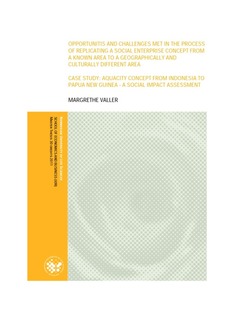| dc.contributor.author | Valler, Margrethe | |
| dc.date.accessioned | 2012-04-27T13:01:07Z | |
| dc.date.available | 2012-04-27T13:01:07Z | |
| dc.date.issued | 2012-04-27 | |
| dc.identifier.uri | http://hdl.handle.net/11250/187333 | |
| dc.description | Main findings and recommendations
• Social enterprises can up-scale by allowing knowledge transfer to happen through people to people encounters, the use of “cultural interpreters” and a participatory approach.
• A social enterprise entering a new country needs to consider land issues, cultural diversity and tolerance, education level and system and work culture.
• A social enterprise needs to encourage dialogue with target groups regarding their hopes and fears about the future and the impact of the project on their lives.
• Social challenges due to transit phases that a local society may be going through are in need to be facilitated in a constructive way. E.g. in PNG there is a transit from subsistence to monetary economy, thus migration issuesand influx of money are considered potential roots of social problems.
• The recommendations and concerns voiced by the impacted people related to the planned project need to be taken into consideration when forming strategies for the development, e.g. cultural centres and the training of life skills knowledge, such as long term planning. | no_NO |
| dc.description.abstract | Rita Westvik and Margrethe Valler conducted in 2010 a Social Impact Assessment in Papua New Guinea for an Asian social enterprise with experience from Indonesia. The purpose was to find out how a vast development project in a coastal swamp area, in a province called East Sepik, would impact on the local people. During field study we also found factors where people could impact the success rate of the project. Hence, the other way around. | no_NO |
| dc.language.iso | eng | no_NO |
| dc.publisher | Norwegian University of Life Sciences, Ås | |
| dc.subject | entrepreneurship | no_NO |
| dc.subject | participatory approaches | no_NO |
| dc.subject | enterprises | no_NO |
| dc.subject | knowledge management | no_NO |
| dc.subject | social conditions | no_NO |
| dc.subject | social development | no_NO |
| dc.subject | Papua New Guinea | no_NO |
| dc.title | Opportunities and challenges can be met in the process of replicating a social enterprise concept from a known area to a geographically and culturally different area. Case study: Aquacity concept from Indonesia to Papua New Guinea : a social impact assessment | no_NO |
| dc.type | Master thesis | no_NO |
| dc.subject.nsi | VDP::Social science: 200::Economics: 210 | no_NO |
| dc.source.pagenumber | 127 | no_NO |
